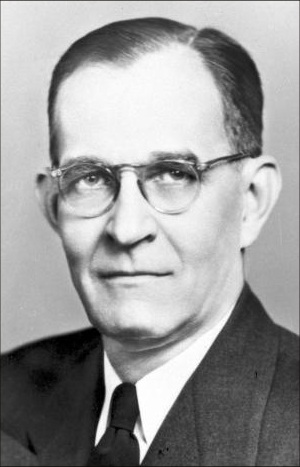Your Public Square Disclosing what is True, what is Real
William B. Umstead (1895-1954)
Publisher's note: We believe the subject of history makes people (i.e., American people) smarter, so in our quest to educate others, we will provide excerpts from the North Carolina History Project, an online publication of the John Locke Foundation. This one hundred and twelth installment was originally posted, by Troy L. Kickler, in the North Carolina History Project.
 As governor of North Carolina from 1953 to 1954, William B. Umstead spent much of his administration bed-ridden, yet he continued working to implement his ideas for what he called a "better tomorrow."
As governor of North Carolina from 1953 to 1954, William B. Umstead spent much of his administration bed-ridden, yet he continued working to implement his ideas for what he called a "better tomorrow."
Umstead had diverse childhood and early professional experiences. Born in Durham County in 1895, the young Umstead grew up on a farm and performed various chores. After graduating from Durham High School, he attended the University of North Carolina at Chapel Hill and earned his history undergraduate degree in 1916. He taught high school for one year. When the United States actively participated in the Great War in 1917, Umstead volunteered and served in Europe with the 317th Machine Gun Battalion. After the war, he started attending Trinity Law School (now Duke University) in 1919, and started practicing law in 1920.
Umstead soon became a political favorite in his community. Voters elected him as Durham County prosecutor in 1922 and in 1926 they voted him as solicitor (now called District Attorney). Starting in 1932, he served three terms as a U.S. Congressman. In this role, he worked to protect the tobacco industry and use national dollars to benefit his district and state by securing funds for rural electrification, soil conservation, Farm Home Administration, and the Tobacco Experiment Station. In 1938, he returned to his law practice, but he returned to Washington, D.C., when Governor R. Gregg Cherry appointed him to a U.S. Senate seat after Josiah Bailey died. He served in this position for two years.
Popular in the Democratic Party ranks, Umstead ran successfully for governor in 1952 and started working to create a "better tomorrow" by increasing government spending and regulation and tackling controversial issues. According to biographer A. W. Stewart, his plans included a ten-percent salary increase for teachers, motor vehicle inspections, and high school driver's training programs. He wanted the state to build more schools and more programs and facilities for the mentally ill. He encouraged the state to diversify its economy and called for a referendum regarding the sale of liquor in the state. He also restructured the State Board of Paroles: a three-member board ensured that paroles were issued in a consistent and fair manner.
Umstead is more famous for his 1954 leadership, however. That year, the U.S. Supreme Court issued the Brown v. Board of Education decision and required public school integration. Umstead worked to avoid racial conflict in the Tar Heel State. He appointed a nineteen, member commission to study how integration might best be accomplished in North Carolina schools. The biracial panel made their recommendations to the General Assembly in 1955, and historians credit Umstead for his leadership decisions that eliminated "intemperate actions" among Tar Heels and the legislators. Later that year, Hurricane Hazel, with winds reaching 150 mph, destroyed $136 million in property and took 19 lives. Umstead called on the national government to declare North Carolina to be a disaster state and to provide relief for its citizens. (Many consider it the worst storm in the state's history.) Umstead also appointed two influential Senators: Willis Smith and Sam Ervin.
After battling bad health throughout his administration, Umstead died from congestive heart failure. Two days after giving his "better tomorrow" speech, Umstead suffered a heart attack and was hospitalized for nearly four months. Once returning to the Executive Mansion, Umstead conducted meetings with government leaders while bed-ridden. His dedication to his gubernatorial work no doubt contributed to his sickliness and lack of recovery. Two more times, Umstead was hospitalized during his short administration. On November 4, he died. He was buried in Durham County.
Sources:
Jeffrey J. Crow, Paul D. Escott, and Flora J.. Hatley. A History of American Americans in North Carolina (Raleigh, 2002); Michael Hill, ed. The Governors of North Carolina (Raleigh, 2007); William S. Powell, North Carolina Through Four Centuries (Chapel Hill, 1989); Milton Ready. The Tar Heel State: A History of North Carolina (Columbia, 2005); A.W. Stewart. "William Bradley Umstead" in William S. Powell, ed., Dictionary of North Carolina Biography (Chapel Hill, 1979-96).
Go Back

When the U.S. Supreme Court issued the Brown v. Board of Education decision, Umstead appointed a biracial committee to study the most effective way to accomplish integration in North Carolina schools.
Umstead had diverse childhood and early professional experiences. Born in Durham County in 1895, the young Umstead grew up on a farm and performed various chores. After graduating from Durham High School, he attended the University of North Carolina at Chapel Hill and earned his history undergraduate degree in 1916. He taught high school for one year. When the United States actively participated in the Great War in 1917, Umstead volunteered and served in Europe with the 317th Machine Gun Battalion. After the war, he started attending Trinity Law School (now Duke University) in 1919, and started practicing law in 1920.
Umstead soon became a political favorite in his community. Voters elected him as Durham County prosecutor in 1922 and in 1926 they voted him as solicitor (now called District Attorney). Starting in 1932, he served three terms as a U.S. Congressman. In this role, he worked to protect the tobacco industry and use national dollars to benefit his district and state by securing funds for rural electrification, soil conservation, Farm Home Administration, and the Tobacco Experiment Station. In 1938, he returned to his law practice, but he returned to Washington, D.C., when Governor R. Gregg Cherry appointed him to a U.S. Senate seat after Josiah Bailey died. He served in this position for two years.
Popular in the Democratic Party ranks, Umstead ran successfully for governor in 1952 and started working to create a "better tomorrow" by increasing government spending and regulation and tackling controversial issues. According to biographer A. W. Stewart, his plans included a ten-percent salary increase for teachers, motor vehicle inspections, and high school driver's training programs. He wanted the state to build more schools and more programs and facilities for the mentally ill. He encouraged the state to diversify its economy and called for a referendum regarding the sale of liquor in the state. He also restructured the State Board of Paroles: a three-member board ensured that paroles were issued in a consistent and fair manner.
Umstead is more famous for his 1954 leadership, however. That year, the U.S. Supreme Court issued the Brown v. Board of Education decision and required public school integration. Umstead worked to avoid racial conflict in the Tar Heel State. He appointed a nineteen, member commission to study how integration might best be accomplished in North Carolina schools. The biracial panel made their recommendations to the General Assembly in 1955, and historians credit Umstead for his leadership decisions that eliminated "intemperate actions" among Tar Heels and the legislators. Later that year, Hurricane Hazel, with winds reaching 150 mph, destroyed $136 million in property and took 19 lives. Umstead called on the national government to declare North Carolina to be a disaster state and to provide relief for its citizens. (Many consider it the worst storm in the state's history.) Umstead also appointed two influential Senators: Willis Smith and Sam Ervin.
After battling bad health throughout his administration, Umstead died from congestive heart failure. Two days after giving his "better tomorrow" speech, Umstead suffered a heart attack and was hospitalized for nearly four months. Once returning to the Executive Mansion, Umstead conducted meetings with government leaders while bed-ridden. His dedication to his gubernatorial work no doubt contributed to his sickliness and lack of recovery. Two more times, Umstead was hospitalized during his short administration. On November 4, he died. He was buried in Durham County.
Sources:
Jeffrey J. Crow, Paul D. Escott, and Flora J.. Hatley. A History of American Americans in North Carolina (Raleigh, 2002); Michael Hill, ed. The Governors of North Carolina (Raleigh, 2007); William S. Powell, North Carolina Through Four Centuries (Chapel Hill, 1989); Milton Ready. The Tar Heel State: A History of North Carolina (Columbia, 2005); A.W. Stewart. "William Bradley Umstead" in William S. Powell, ed., Dictionary of North Carolina Biography (Chapel Hill, 1979-96).
Latest Body & Soul
|
The campaign for former President Donald Trump released a statement Saturday afternoon condemning the White House’s declaration of Easter Sunday as “Transgender Day of Visibility.”
Published: Thursday, April 4th, 2024 @ 1:31 pm
By: Daily Wire
|
|
He is risen!
Published: Saturday, March 30th, 2024 @ 8:06 pm
By: Stan Deatherage
|
|
The great misnomer for non Christians that the day Jesus Christ was executed by occupying Romans, celebrated by Christians as "Good" Friday, must be a paradox of ominous proportions.
Published: Saturday, March 30th, 2024 @ 7:52 pm
By: Stan Deatherage
|
|
The North Carolina Department of Health and Human Services is launching a Community Partner Engagement Plan to ensure the voices of North Carolina communities and families continue to be at the center of the department’s work.
Published: Tuesday, March 26th, 2024 @ 2:43 pm
By: Eastern NC NOW Staff
|
|
The North Carolina Department of Health and Human Services will host a live Spanish-language Cafecito and tele-town hall on Tuesday, Feb. 27, from 6 to 7 p.m., to discuss how to support and improve heart health as well as prevent and manage heart disease.
Published: Saturday, March 23rd, 2024 @ 8:56 pm
By: Eastern NC NOW Staff
|
|
Part of ongoing effort to raise awareness and combat rising congenital syphilis cases
Published: Saturday, March 23rd, 2024 @ 6:18 pm
By: Eastern NC NOW Staff
|
|
Recognition affirms ECU Health’s commitment to providing highly-reliable, human-centered care
Published: Wednesday, March 20th, 2024 @ 10:47 pm
By: Eastern NC NOW Staff
|
|
The North Carolina Department of Health and Human Services is launching a new Statewide Peer Warmline on Feb. 20, 2024. The new Peer Warmline will work in tandem with the North Carolina 988 Suicide and Crisis Lifeline by giving callers the option to speak with a Peer Support Specialist.
Published: Wednesday, March 20th, 2024 @ 1:29 am
By: Eastern NC NOW Staff
|
|
A subsidiary of one of the largest health insurance agencies in the U.S. was hit by a cyberattack earlier this week from what it believes is a foreign “nation-state” actor, crippling many pharmacies’ ability to process prescriptions across the country.
Published: Tuesday, March 5th, 2024 @ 1:12 am
By: Daily Wire
|












 Publisher's note: We believe the subject of history makes people (i.e., American people) smarter, so in our quest to educate others, we will provide excerpts from the
Publisher's note: We believe the subject of history makes people (i.e., American people) smarter, so in our quest to educate others, we will provide excerpts from the 









